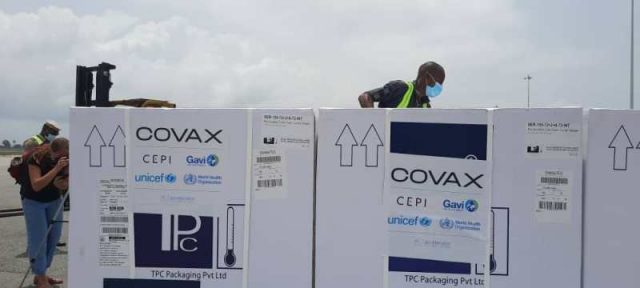…COVAX will close 31 December 2023 having delivered nearly 2 billion doses of vaccines to 146 economies, and averted an estimated 2.7 million deaths in AMC lower-income participating economies.
…COVAX’s end-to-end efforts helped lower-income economies achieve two-dose coverage of 57%, compared to the global average of 67%.
…Low- and lower middle-income economies will continue to receive COVID-19 vaccines and delivery support from Gavi, the Vaccine Alliance in 2024 and 2025, with 83 million doses so far requested for 2024 from 58 economies.
WED, DEC 20 2023-theGBJournal|COVAX, the multilateral mechanism for equitable global access to COVID-19 vaccines launched in 2020, will draw to a close on 31 December.
Jointly led by the Coalition for Epidemic Preparedness Innovations (CEPI), Gavi, the Vaccine Alliance (Gavi), UNICEF and the World Health Organization (WHO), COVAX has so far supplied nearly 2 billion COVID-19 vaccine doses and safe injection devices to 146 economies.
Its efforts are estimated to have helped avert the deaths of at least 2.7 million people in the COVAX Advance Market Commitment (AMC) low- and lower middle-income participating economies (lower-income economies) that received free doses through the mechanism, alongside nearly US$ 2 billion in critical support to turn vaccines into vaccinations.
These 92 lower-income economies that were eligible to participate in the programme with support from the financing mechanism known as the Gavi COVAX Advance Market Commitment (COVAX AMC) will continue to have the option to receive COVID-19 vaccine doses and delivery support through Gavi’s regular programmes.
So far, 58 lower-income economies have requested a total of 83 million doses in 2024, with plans to focus on the continued protection of priority groups, including health care workers, community workers and older adults.
COVAX was designed as an end-to-end coordination mechanism encompassing R&D and manufacturing, policy guidance, vaccine portfolio development, regulatory systems, supply allocation and country readiness assessments, transport logistics, vaccine storage and administration, and monitoring country coverage and absorption rates.
However, as an emergency solution launched in the midst of the pandemic, COVAX faced many challenges. Without having any cash reserves up front, it was initially limited in its ability to sign early contracts with manufacturers, and while it was able to ship doses to 100 economies in the first six weeks of global roll-out, export bans and other factors meant that large-volume deliveries were only received in the third quarter of 2021.
COVAX also deployed 2.5 million doses to protect the most vulnerable in humanitarian and conflict settings through a first-of-its kind mechanism called the Humanitarian Buffer, co-designed with international humanitarian organisations, and set up as a last resort to reach those who are not easily reached through government programmes.
“Millions of people are alive today who would not have been here without COVAX. Those averted deaths mean mothers can continue to nurture their children, and grandparents can enjoy watching future generations flourish,” said Jane Halton, Chair of the Board of CEPI. “Despite being built and funded from scratch amid the deadliest pandemic the world has seen in more than a century, COVAX’s life-saving accomplishments were considerable. It should take its place in history and be proud of what it was able to accomplish but also serve as a reminder to us all that we can and must do better next time.”
“COVID-19 has been the greatest health challenge of our time, and it was met with innovation and partnership on an equally unprecedented scale,” said José Manuel Barroso, Chair of the Board of Gavi, the Vaccine Alliance.
“COVAX’s impact has been historic, as are the insights it has generated on how, concretely, the world can do better next time. As we transition COVID-19 into Gavi’s routine programming, we do so with deep gratitude for the passion, dedication and sacrifice of so many around the globe who fought tirelessly for three years to try and create a more equitable world – and with an unwavering commitment to improve by transforming learnings into tangible action.”
“The joint efforts of all partners to ensure an equitable response to the pandemic helped protect the futures of millions of children in vulnerable communities,” said UNICEF Executive Director Catherine Russell. “This huge and historic undertaking is something we can be collectively proud of and build on. UNICEF will continue to deliver vaccines to the world’s youngest to stop the spread of all preventable diseases and build strong health systems for the future.”
“We knew that market forces alone would not deliver equitable access to vaccines and other tools,” said Dr Tedros Adhanom Ghebreyesus, WHO Director-General. “The creation of ACT-A and COVAX gave millions of people around the world access to vaccines, tests, treatments and other tools who would otherwise have missed out. COVAX has taught us valuable lessons that will help us to be better prepared for future epidemics and pandemics.”
X-@theGBJournal|Facebook-the Government and Business Journal|email:gbj@govbusinessjournal.com|govandbusinessj@gmail.com










